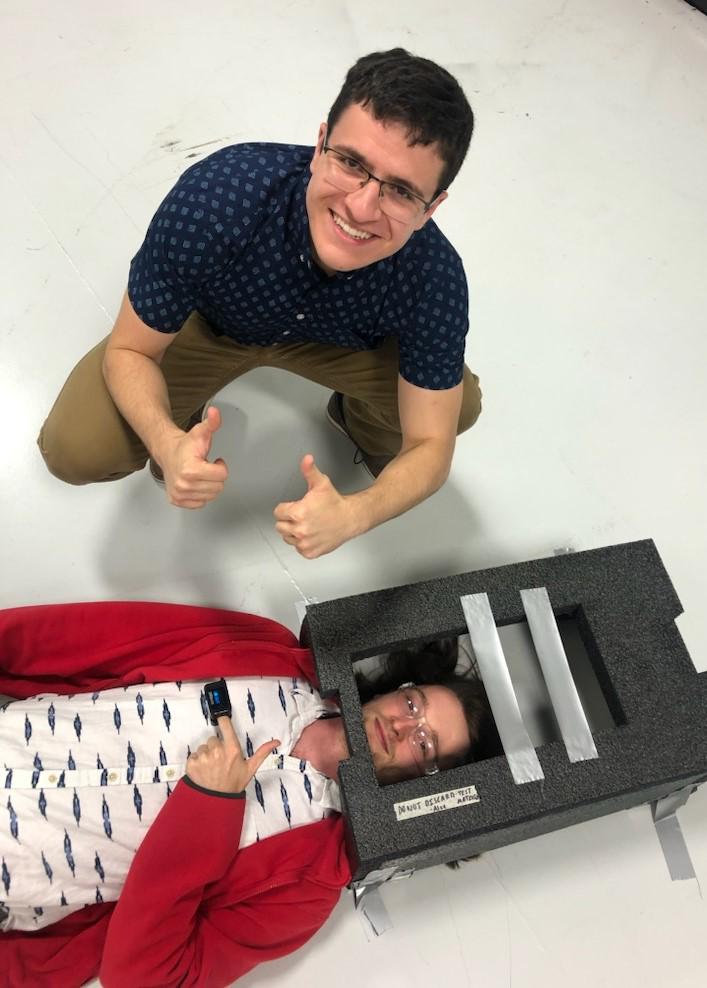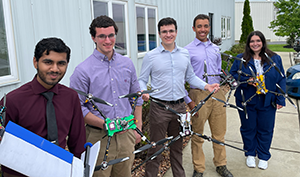An Internship with Impact
When Ben Falco was growing up in Southern Maryland, he often watched planes from the nearby naval air station flying overhead. The sight ultimately inspired him to decide on aerospace engineering as a college major and career path. This summer, the UMD sophomore returned to the area where he grew up, this time as a summer intern for the UMD UAS Research and Operations Center (UROC). He was among five enterprising students accepted for this year’s summer internships, which provide the opportunity to think up bold new UAS applications and then develop and test them. “It’s very hands-on,” Falco said. “We get to build and assemble our projects, and then fly them.” Each participant started off with a proposal drawn up in collaboration with a faculty advisor. The students then worked on-site at UROC’s facility in California, MD to build, test, and troubleshoot their projects. Falco set out to develop a pursuit-evasion system for drones–an idea he came up with in collaboration with his faculty mentor, UMD aerospace engineering assistant professor Michael Otte. “I used reinforcement learning to create an algorithm that trains itself on how to catch an evader,” Falco said. “During the ‘flight week’ part of the internship, I was able to fly three drones and have two of them chase the other.” While Falco was busy with his invader-chasing algorithm, fellow intern Alex Teacu focused on how drones can support medical personnel in saving lives. More specifically, his project concerned mass casualty situations—such as war or natural disaster–where the need for speed in triage can make the difference between life and death. A rising senior in aerospace engineering, Teacu developed his proposal in collaboration with Derek Paley (aerospace engineering), director of the Maryland Robotics Center and PI of a major, multi-institutional project dubbed AI and Autonomy for Multi-Agent Systems (ArtIAMAS). Drones equipped with the right sensors can potentially help. The sensors can track the subtle changes in skin color caused by a beating heart to measure heart rate, and record chest motion to determine respiratory rate. Information from the drones could be used to help first responders more effectively treat the most seriously injured first. “You only have so many nurses and medics, and so many vehicles, that can go out and help all the people that need help,” Teacu said. “On the other hand, drones are becoming so cheap now that it makes sense to send them out into the field to conduct automated triage. We can use them to find out who needs help and who need to be helped first. That can save many lives.” Falco’s and Teacu’s projects are just two out of the five undertaken this year by UROC summer interns, who also included Ranger Matthew (Virginia Tech), Jatin Soni (Purdue), and Hailey Ungar (College of Southern Maryland). UROC summer internships are offered each year to selected students, following an application process that includes a written proposal. The opportunity is open to rising sophomores to rising seniors enrolled in accredited community college or university, and studying in a technical field. This year, applications will be accepted beginning in October. For more information, visit go.umd.edu/interns. 2023 UROC Summer Internship Projects Ben Falco, University of Maryland: UAV Pursuit and Evasion (Advisor: Dr. Michael Otte)
Related Articles: August 18, 2023 Prev Next |



